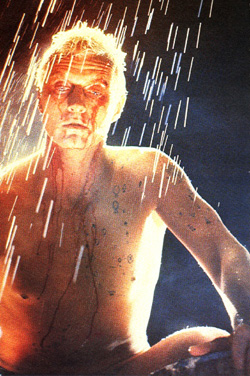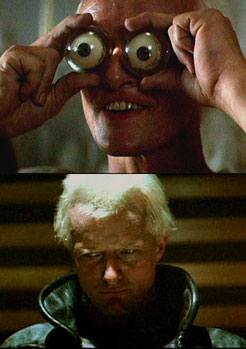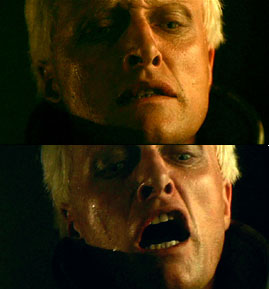
"Fiery, the angels fell..."
Scott's vision on the divine but outcast
non-human (as played by Rutger Hauer).

Blade Runner, Ridley Scott's adaptation of the Philip K. Dick novel Do Androids Dream of Electric Sheep?, remains one the more influential visions of the android twenty-three years after its creation. The Dick novel is also well-known and respected, yet it has not gripped the public consciousness as fully. What have we found in one that is missing in the other? To begin to answer, we may examine the character called Roy Baty in the book and Roy Batty in the film.
More philosphical than you'd expect an android to be...
Roy Bat(t)y is quite different in book & film, though he shares many notable qualities. In both media, he is the leader of six escaped androids, highly intelligent and more philosophical than you'd expect an android to be, yet at the same time very childlike in action and expression. Dick and Scott use this disconcerting childlike quality to very effective but very different ends.
The novel describes an android's uncanny qualities as coming foremost from its lack of empathy: it is physically incapable of empathy towards any creature and is motivated only by its own survival. This basic notion is questioned several times (for instance, when the androids are seen mourning the death of other androids); yet the bounty hunter protagonist Deckard needs desperately to return to idea of the "clever machine" (Dick 141) if he is to look at himself in the mirror every morning. Baty's humanistic spiritual leanings are written off as "a pretentious fiction" (185).
Like three schoolyard bullies, the androids sit around a tiny spider, snipping its legs off one by one
The author further allies himself with Deckard and shows Baty as the enemy other by describing him as looking "brutal", having a "crooked, tuneless smile", and an air of "almost deliberate vulgarity" (153). These are petty, unconvincing accusations not relevant to the hatred of all humanoid machines, since Deckard sees female androids as physically appealing enough to sleep with.
A final scene with the Baty and his band of escapees is much more persuasive of their inhuman, or rather inhumane, qualities: like three schoolyard bullies, the androids sit around a tiny spider, snipping its legs off one by one, and forcing it to walk by lighting a match near it's body. Their distraught human companion can do nothing to dissuade them: one female responds to his cries by asking, "What's the matter? You didn't lose anything; we'll pay you..." (210). The androids act as children who have not realized basic, universal connection of mortality; they care only for their own pleasure and live within a sinister, self-sustained moment.
Batty shows a gift for mystical musings and childlike mannerisms, an unusual and unsettling combination

Telling a fellow android of another android's death, he drops his head like a child and loses control of his adult face. Soon he forgets, having a child's attention span, perhaps, yet a child whose first instinct is always to survive. Batty entertains his human host J.F. Sebastian by playing with toys, then quickly moves in to get what he needs. Sebastian is visibibly charmed then distrurbed by Roy's rapid changes and ease of manipulation; but he needs friends as much as Roy needs to survive, so he chooses to help the child.
We are endeared to the replicants and will defend any undesirable actions as motivated by pitiable desperation rather than soulless sadism
Batty also displays a child's quick temper and easy laughter throughout the film, giving a more idealized view of the child-robot than Dick: Scott leaves room for more playfulness and less cruelty, so that we are endeared to the replicants and will defend any undesirable actions as motivated by pitiable desperation rather than soulless sadism.
It is interesting to note that, in the film, the human protagonist Deckard is seen as the cause of many more killings than Batty. Though we know Deckards victims are replicants, we still see fatally wounded humans. Batty is shown intimidating others for information, and even enjoying the misery of his targets; but he gives up the opportunity to kill Deckard and instead gives his own life. (His clock has literally run out anyway, but the film offers it as a sacrifice).
 "I've done... questionable things..."
"I've done... questionable things..."When we do see him kill, it is an allegorical, heroic act--Prometheus stealing the fire, Satan confronting his Father, Batty destroying his deadbeat dad--the roboticist Tyrell. It is an extended, brutal moment, yet the director ensures that we feel more for the murderer: the camera stays with Batty's tortured face, showing Tyrell only briefly so we know what has been done. Deckard kills for money, but Batty kills for love: this hurts him much more than it hurts you, and coming through that agony to the other side could only be someone beyond us, non-human indeed but transcended beyond the failings of humanity, being strong enough to do what we only wish we could.
Batty just smiles sadly, unconvinced, then smirks and rises to kill.
Philip K. Dick gives little substance to Baty in his book, putting all his chips on Deckard, the imperfect but identifiable, noble everyman. When asked to explain the difference between his and Scott's replicants, Dick said, "To me, the replicants are deplorable. They are cruel, cold, and heartless" (Rickman 107). Scott, on the other hand, casts the replicants as superhuman, divine even, but cast out for their difference. Approaching Dick's villains, Scott would like them to be righteous in their power, unflinching in their cruelty; yet he allows Batty to betray very human guilt, sorrow, and longing.
When Roy visits his creator, he confesses, "I've done... questionable things." Tyrell, who could be the voice of Scott, argues, "Also extraordinary things. Revel in your time"; but Batty just smiles sadly, unconvinced, then smirks and rises to kill. This is anything but asencion, however. Early in the film, Batty introduces himself by paraphrasing Blake, "Fiery the angels fell...", when the line actually reads, "Fiery the angels rose": though he may appear to be an avenging angel, he sees himself as fallen, demonic, never human and never divine.
MORE ON BLADE RUNNER AND PHILIP K. DICK:
BIBLIOGRAPHY